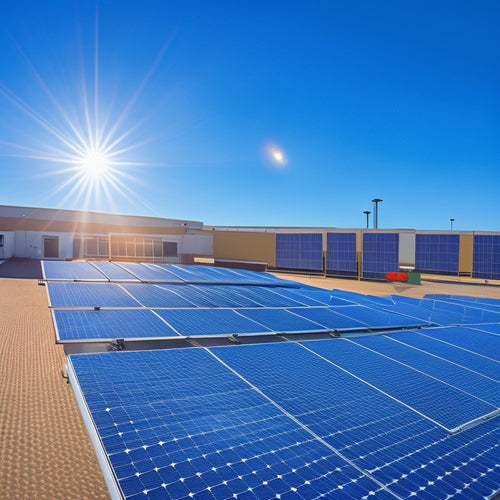
Home Batteries for Solar Storage
Share
You're investing in a home battery for solar storage to utilize the full potential of your renewable energy system. By storing excess energy generated during the day, you'll enjoy energy independence at night, even during grid failures. Home batteries minimize grid overflow, reducing energy waste and promoting overall efficiency. Deep cycle batteries, vital for home energy storage, offer a long cycle life with minimal maintenance. To optimize performance, it's important to check the battery's depth of discharge, as excessive deep discharging can reduce lifespan. Now, investigate the benefits of lithium-ion batteries and find out how they can enhance your solar storage system.
The Essentials
- Home batteries store excess solar energy for later use, reducing reliance on the grid and promoting energy independence.
- Correctly sized batteries optimize energy usage, reduce waste, and maximize self-consumption, leading to lower energy expenses.
- Home batteries minimize grid overflow by storing excess energy, enhancing grid stability and promoting overall energy efficiency and reliability.
- Deep cycle batteries, essential for home energy storage, have a long cycle life and require minimal maintenance, enhancing cost efficiency.
- Effective battery management strategies, such as DOD monitoring and voltage regulation, are crucial for peak performance and longevity.
Energy Independence At Night
You can power through the night with a home battery, using the excess energy generated by your solar panels during the day to keep your lights on and appliances running.
By storing energy for later use, you'll reduce your reliance on the grid and enjoy true energy independence.
With a battery storage system, you'll also eliminate energy waste and protect yourself from grid outages and fluctuations Solar Energy Storage Solutions, ensuring a more sustainable and dependable power supply.
This means you'll have an uninterrupted energy supply, even when the grid goes down.
Power Through The Night
How do homeowners guarantee a steady supply of energy after the sun sets?
With the advancements in battery technology, you can now capture the power of renewable energy even at nighttime. By switching to a home solar power battery, you'll enjoy reduced energy expenses and uninterrupted power supply.
A solar battery, designed specifically for energy storage, allows you to store excess energy generated during the day for use during the night. This means you can enjoy energy independence at night, without relying on the grid.
Uninterrupted Energy Supply
With excess energy stored in your solar battery during the day, nighttime energy independence becomes a reality. You can rely on your stored energy to power your home even when the sun goes down. This uninterrupted energy supply guarantees that you're not dependent on the grid, giving you the freedom to live life on your own terms.
By utilizing the power of renewable energy systems Home Solar Battery, you can reduce your reliance on non-renewable energy and shield yourself from fluctuating grid prices.
Your solar battery acts as a backup system, providing a seamless shift from solar power to stored energy when the sun sets. This means you can continue to power your appliances, lights, and other essentials without interruption.
The energy storage capacity of your solar battery determines how long you can sustain yourself off-grid during the night. By sizing your battery correctly, you can enjoy an uninterrupted energy supply that meets your specific needs.
With a reliable backup system in place, you can rest easy that you'll always have access to the energy you need, whenever you need it. This level of energy independence gives you the flexibility to live life on your own terms, without being tied to the grid.
Reduced Energy Waste
When you generate more solar energy than you're using, it typically goes back into the grid.
But with a home battery, you can minimize grid overflow by storing excess energy for later use.
By integrating a reliable backup power solution renewable energy systems, you can guarantee a steady supply of energy even during power outages.
This reduces energy waste and allows you to optimize your energy usage by shifting non-essential loads to times when your solar panels are producing power.
Minimize Grid Overflow
Your home solar storage system's ability to minimize grid overflow is vital in reducing energy waste. When your solar panels generate more energy than you're using, the excess is sent back to the grid. Without a home battery, this excess energy is wasted, as it's not stored for later use. With a home battery, you can store this excess energy and use it when you need it, reducing your reliance on the grid and minimizing grid overflow.
Effective grid management is fundamental in achieving energy efficiency. By storing excess energy, you're not only reducing energy waste but also reducing the strain on the grid during peak hours. This helps to prevent brownouts and blackouts, ensuring a more reliable energy supply.
Here's a comparison of grid overflow with and without a home battery:
| With Home Battery | Without Home Battery | |
|---|---|---|
| Excess Energy | Stored for later use | Sent back to grid and wasted |
| Grid Reliance | Reduced | Increased |
| Energy Efficiency | Improved | Decreased |
| Grid Stability | Enhanced | Compromised |
Optimize Energy Usage
Two primary benefits of optimizing energy usage in your home solar storage system are reducing energy waste and maximizing self-consumption. By doing so, you'll be able to make the most of the energy generated by your solar panels and reduce your reliance on the grid.
This is especially important if you're looking to achieve energy independence.
To optimize energy usage, you'll need to monitor and control your energy consumption in real-time. This can be achieved through the use of smart home automation systems that integrate with your solar storage system.
These systems allow you to track your energy usage patterns and identify areas where energy is being wasted. With this information, you can make adjustments to your energy usage habits and optimize your system for maximum energy efficiency.
Deep Cycle Battery Benefits
You'll find that deep cycle batteries offer several advantages when it comes to storing excess energy generated by your solar panels.
They play an essential role in residential solar power systems, allowing homeowners to store energy for later use. For one, they've a long cycle life, meaning they can charge and discharge many times without losing their capacity.
Additionally, they require very little maintenance, making them a convenient option for your home energy storage needs.
Long Cycle Life
Most deep cycle batteries are designed to provide a long cycle life, typically ranging from 3,000 to 5,000 charge/discharge cycles, depending on the manufacturer and model. This means you can recharge and use your battery repeatedly without worrying about its performance degrading quickly. A long cycle life translates to a longer lifespan for your battery, reducing the need for frequent replacements and minimizing waste.
| Battery Chemistry | Lifespan Factors | Performance Metrics |
|---|---|---|
| Lead-Acid | Temperature, Depth of Discharge (DOD) | Capacity, Round-Trip Efficiency |
| Lithium-Ion | Charge/Discharge Cycles, DOD | Energy Density, Cycle Life |
| Flow Battery | Electrolyte Health, Pumping Efficiency | Capacity, Response Time |
When choosing a deep cycle battery, consider factors like usage patterns, environmental impact, and cost considerations. With advancements in technology, you can now opt for installation options that cater to your specific needs. Market trends suggest a growing demand for sustainable energy storage solutions, and user experiences have shown that deep cycle batteries can provide the freedom and reliability you need to power your home.
Low Maintenance Needs
Every deep cycle battery is designed to require minimal upkeep, ensuring that your energy storage system operates smoothly with minimal interruptions. This means you'll spend less time and money on maintenance, allowing you to focus on what matters most - enjoying the freedom and independence that comes with utilizing renewable energy.
With deep cycle batteries, you can expect fewer replacement parts, reduced labor costs, and lower instances of system downtime. This translates to increased cost efficiency, as you'll spend less on maintenance and repairs over the lifespan of your energy storage system.
Additionally, the reduced need for replacement parts and labor means a lower environmental impact, aligning with your values of sustainability and eco-friendliness.
You'll also appreciate the reduced risk of system failures and power outages, ensuring that your home or business remains powered and productive even during grid outages.
Check Battery Depth of Discharge
When you're setting up your home solar storage system, it's essential to check the battery depth of discharge (DOD) to guarantee peak performance and longevity, especially when considering top home battery solutions like Tesla Powerwall and LG Chem RESU for renewable power backup.
You'll want to aim for a peak DOD level that balances energy storage with battery health, as excessive deep discharging can reduce the battery's lifespan.
Optimal DOD Levels
You've invested in a home battery for solar storage, and now it is essential to understand how to enhance its performance. One key aspect to take into account is the ideal Depth of Discharge (DOD) levels, which vary depending on the battery chemistry and desired energy efficiency.
| Battery Chemistry | Ideal DOD (%) | Cycle Life (approx.) |
|---|---|---|
| Lead-Acid | 50 | 200-300 cycles |
| Nickel-Cadmium | 80 | 500-700 cycles |
| Lithium-Ion | 80-90 | 1,000-2,000 cycles |
| Sodium-Ion | 70-80 | 500-1,000 cycles |
| Flow Battery | 90-100 | 5,000-10,000 cycles |
As shown in the table, different battery chemistries have unique ideal DOD levels. For example, lead-acid batteries should be discharged to 50% to guarantee a cycle life of around 200-300 cycles. In contrast, lithium-ion batteries can be discharged to 80-90% without greatly affecting their cycle life. Understanding these ideal DOD levels is vital to maximizing energy efficiency and extending the lifespan of your home battery.
Avoiding Deep Discharge
To maximize the lifespan of your home battery, it's crucial to monitor and control its Depth of Discharge (DOD). Avoiding deep discharge is critical to guarantee battery longevity and peak performance. You can achieve this by implementing effective battery management strategies, including voltage regulation and load balancing. This will prevent excessive discharge rates, which can cause irreversible damage to your battery.
By monitoring your battery's performance, you can identify potential issues and adjust your charging strategies accordingly. This may involve adjusting your energy efficiency settings or modifying your load balancing configurations. Regular performance monitoring will help you detect any anomalies and take corrective action to prevent deep discharge.
A well-designed battery management system will also help you enhance your battery's charging and discharging cycles. This will confirm that your battery is operating within its recommended DOD levels, thereby extending its lifespan.
Lithium-Ion Long Cycle Life
You're likely considering lithium-ion batteries for your solar storage system because of their high energy density and low self-discharge rate.
However, you should also evaluate their cycle life expectancy, which refers to the number of charge and discharge cycles a battery can support before its capacity degrades.
A longer cycle life means your battery will retain its performance over more charge cycles, reducing the need for premature replacement.
Cycle Life Expectancy
As the demand for renewable energy solutions continues to grow, understanding the cycle life expectancy of lithium-ion batteries becomes increasingly essential.
You're likely wondering how long these batteries will last and how many charge/discharge cycles they can handle. The cycle life expectancy of a lithium-ion battery is typically measured by its ability to retain a certain percentage of its original capacity after a specified number of cycles.
Thanks to battery chemistry advancements, modern lithium-ion batteries can last for up to 5,000 cycles or more, with some manufacturers claiming up to 10,000 cycles.
This means you can expect a lithium-ion battery to last for 10 to 15 years or more, depending on your usage patterns. This extended lifespan makes lithium-ion batteries an attractive option for sustainable storage solutions, allowing you to store excess energy generated by your solar panels during the day for use at night or during power outages.
Frequently Asked Questions
Can I Use a Single Battery for My Entire Home's Energy Needs?
You're wondering if a single battery can power your entire home; unfortunately, it's unlikely, as battery capacity limits would compromise energy independence, and high installation costs would outweigh benefits, leaving you without reliable backup power during outages.
How Do I Know Which Battery Type Is Best for My Solar System?
When selecting a battery, you'll want to evaluate battery efficiency and capacity ratings to guarantee it meets your energy needs; look for high-efficiency batteries with suitable capacity ratings to maximize your solar system's output and achieve energy independence.
Are Home Batteries Compatible With My Existing Solar Panels?
You'll need to check your solar panel system's specifications to guarantee battery compatibility, as integration requirements vary; verifying voltage, ampere, and communication protocols will confirm whether your existing panels can seamlessly integrate with a new battery.
Can I Charge My Electric Vehicle With a Home Battery?
Did you know 80% of EV owners also have solar panels? You can charge your electric vehicle with a home battery, leveraging EV integration for efficient battery charging and reducing reliance on the grid, granting you energy freedom.
Do Home Batteries Require Regular Maintenance or Replacement?
You'll need to perform regular maintenance to extend your battery's lifespan, including monitoring temperature, updating software, and ensuring proper ventilation; following these maintenance tips will help you get the most out of your battery.
Final Thoughts
As you utilize the power of solar energy, don't let it slip away. Home batteries for solar storage are key to accessing energy independence at night and reducing energy waste. By choosing deep cycle batteries and monitoring their depth of discharge, you'll reap the benefits of reliable backup power. And with lithium-ion batteries, you'll enjoy a long cycle life. Remember, "an ounce of prevention is worth a pound of cure" - invest in a quality home battery system to guarantee a brighter, more sustainable future.
Related Posts
-

Top 10 Off Grid Camping Gear Must-Haves
When you're off-grid camping, the right gear is crucial for a smooth expedition. Start with a durable, weather-resist...
-

Smart Grid Technology Implementation Challenges
You'll encounter several challenges when implementing smart grid technology, particularly in cost management, scalabi...
-

Essential Solar Panel Mounts for Commercial Properties
When it comes to essential solar panel mounts for your commercial property, durability and wind resistance are key fa...


